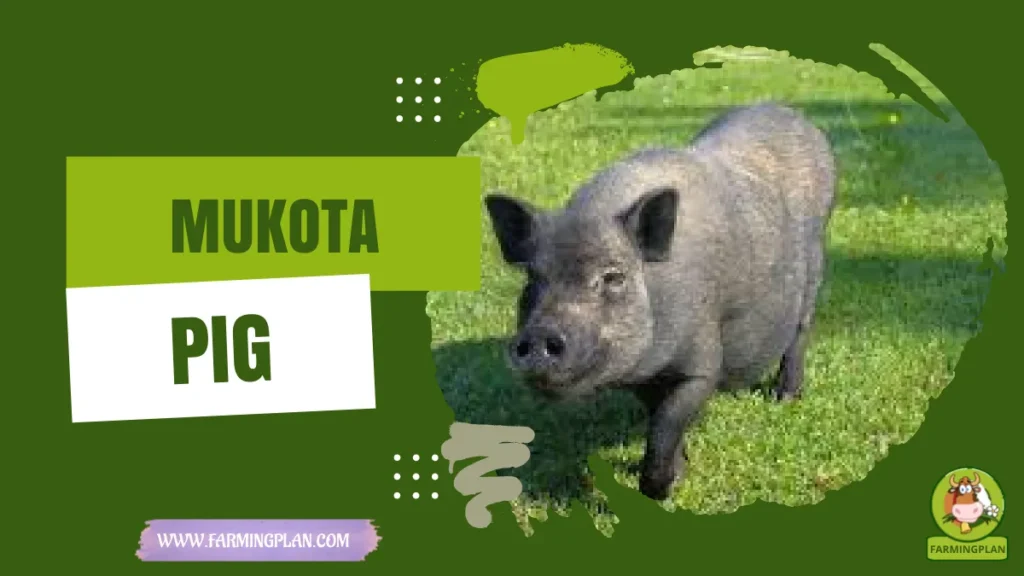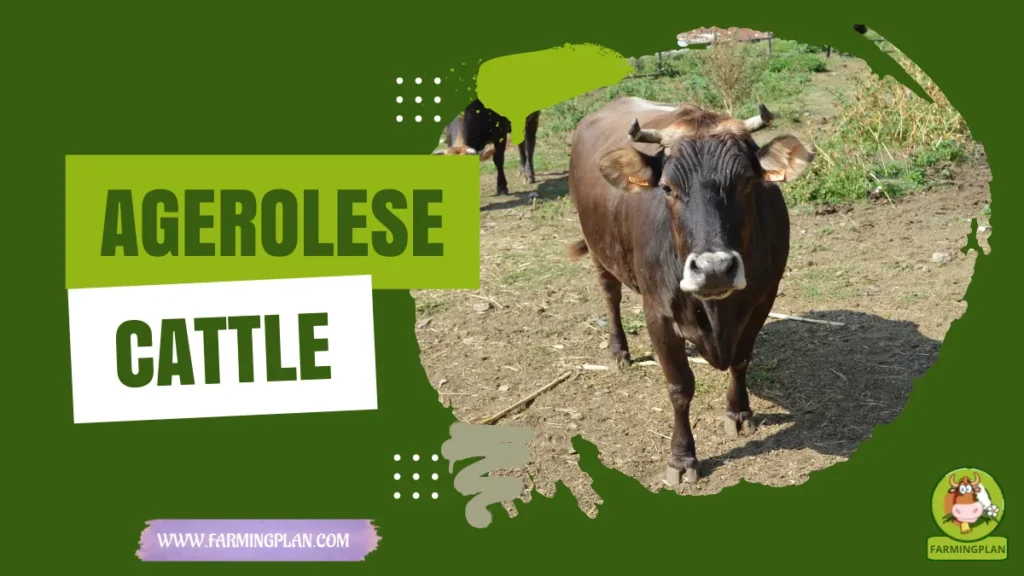Valais Blacknose Sheep are often called the cutest sheep in the world—and it’s easy to see why. With their fluffy white fleece, spiral horns, and signature black faces, these friendly animals have captured hearts from the Swiss Alps to backyards around the globe. Originally from the snowy mountains of Switzerland, this black-nosed sheep breed is more than just a pretty face. They’re known for their calm nature, quality wool, and incredible adaptability. Whether you’re a farmer, animal lover, or hobbyist, learning about these charming animals is both fun and rewarding.
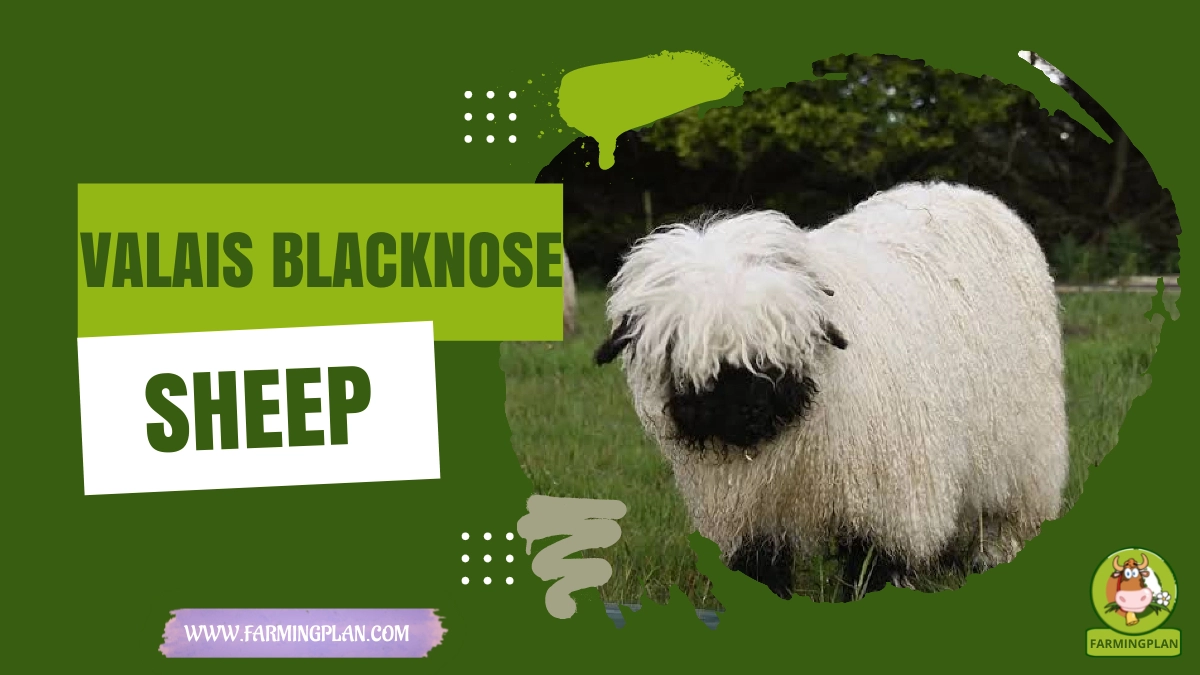
History & Origin – A Noble Swiss Heritage
The Valais Blacknose Sheep come from the Valais region in Switzerland, where they’ve thrived in the high Alpine mountains for centuries. This breed, known locally as the Walliser Blacknose Sheep, has been documented as far back as the 15th century. Farmers in the steep, rocky terrain of the Swiss Alps relied on these sheep for both their quality wool and their ability to survive harsh mountain conditions.
Bred to be strong and resilient, these Swiss Valais Blacknose Sheep adapted to cold temperatures, rough paths, and limited grazing options. Their incredible adaptability, honed over centuries in the harsh Alpine mountains, reassures breeders that they can thrive in a variety of conditions.
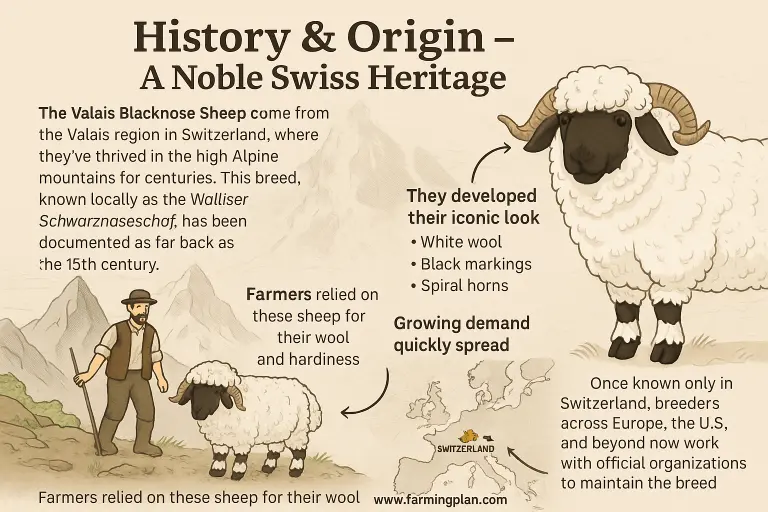
Over time, they developed their iconic look—white wool with deep black patches on the face, knees, and feet, plus those distinctive spiral horns. While they were once known only in Switzerland, their popularity spread quickly. Today, they appear at international shows, feature in breeding programs, and are even found in plush toy designs because of their unforgettable appearance.
As the demand for Valais sheep grows, breeders across Europe, the U.S., and beyond now work with official organizations like the Valais Blacknose Sheep Society. This society plays a crucial role in protecting the breed’s lineage and maintaining its exceptional qualities. They do this through various initiatives such as breed standards, genetic testing, and educational programs.
Characteristics – What Makes Them So Unique
The Valais Blacknose Sheep stand out not just for their friendly personalities, but also for their striking appearance. These black faced Valais sheep are covered in thick, white wool with bold black patches on their noses, eyes, ears, knees, and feet. This color contrast makes them look like living stuffed animals, a unique and fascinating sight to behold.
One of their most iconic traits is their spiral horns, which appear in both rams and ewes. These horns give them a noble, almost mythical look that draws admiration at every Valais Blacknose Sheep Show. As a dual-purpose breed, these sheep offer both high-quality wool and, in some regions, meat. Their white wool is long, soft, and perfect for spinning or crafting, making them a favorite among wool artisans.
Valais lambs are just as eye-catching. A Valais black nose lamb has the same black facial features and woolly body from a very young age, making them adorable from birth. As they grow, their black markings remain clear and sharp, helping breeders identify pure lineage easily. This process of identifying pure lineage is crucial for maintaining the breed’s genetic purity and ensuring the continuation of its unique traits.
These sheep are medium to large in size, with strong legs and a sturdy body made to handle harsh mountain conditions. Their thick fleece protects them from the cold, and their hooves are naturally tough, making them perfect for rocky paths. Whether raised for wool, shows, or just as part of a hobby farm, Valais Blacknose Sheep are known for their incredible animal features and irresistible charm.
Nature & Temperament – The Friendliest Black-Nosed Sheep
The Valais Blacknose Sheep aren’t just known for their good looks—they’re also incredibly sweet. These sheep have a calm, gentle nature that makes them a favorite among families, hobby farmers, and first-time livestock owners. Unlike some sheep breeds that are shy or nervous, black faced Valais sheep enjoy human interaction.
They often come right up to you for attention or a treat. Their friendly behavior makes them ideal for small farms, petting zoos, and even therapy animal programs. These animals are social and enjoy the company of other sheep. It’s best to keep them in small flocks where they can bond and feel safe.
Their easygoing nature also makes handling, grooming, and medical care much simpler—even for beginners. Because they were originally bred in the Swiss mountains, Valais Blacknose Sheep are naturally alert and active. But they’re never aggressive. Even rams are typically calm and respectful when handled properly. This kind of personality makes them a joy to raise and a great addition to any farm or rural home.
Food & Diet – What Valais Blacknose Sheep Love to Eat
Feeding your Valais Blacknose Sheep the right diet is key to keeping them healthy and happy. These sheep thrive on a natural, balanced diet, just like they did in the mountains of Switzerland. Their main food source should be fresh grass when grazing is available. During colder months or when pasture is limited, you can give them high-quality hay. Make sure it’s clean and free of mold.
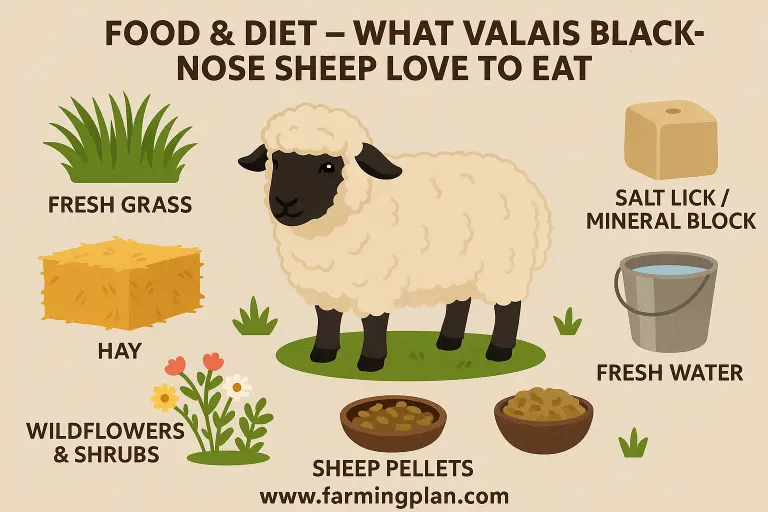
They also need access to a salt lick or mineral block to get essential nutrients. For added health, many farmers provide sheep pellets with vitamins, but these should be used in moderation. Because they’re a mountain breed, Valais sheep love munching on natural forage like wildflowers and shrubs. These extras help mimic their native diet and improve wool quality. Don’t feed them anything moldy, salty human snacks, or too many grains. These can upset their stomach and lead to health issues.
Clean, fresh water must always be available. If the water freezes in winter, use a heated bucket or check it often. Feeding your Valais Blacknose lambs? Offer them milk replacer or bottle feed if the ewe can’t nurse. Slowly introduce hay and pellets as they grow. Keeping their diet simple and natural is the best way to support strong growth and excellent quality wool.
“Meet The Sheep So Cute They Look Like Living Plush Toys—And Yes, They’ll Walk Right Up For A Cuddle.”
Usage & Purpose – Not Just Cute, But Practical
The Valais Blacknose Sheep may be known for their looks, but they’re also incredibly useful. This breed is considered dual-purpose, meaning they are raised for both wool and, in some regions, meat. Their thick, white fleece is long and strong, making it great for spinning, knitting, and crafting. This practicality makes them a smart choice for small-scale farmers and hobby breeders, providing a wealth of useful resources.
Crafters love their wool for its excellent quality and durability. The high yield of wool per sheep also makes them a smart choice for small-scale farmers and hobby breeders.
In some areas, farmers also raise Valais lambs for meat, though the breed’s popularity as a pet or show animal has made that less common. People now see them as part of the family, or the star of the barnyard. These sheep are also popular in shows around the world. Events like the Black Sheep Gathering & USA National Show give owners a chance to display their animals and compete for prizes.
Their charm, personality, and bold features often make them show favorites. Beyond farming and fiber, these sheep have even inspired plush animals and stuffed toys due to their fluffy look and black noses. Some families keep them just as adorable pets. So whether you’re after quality wool, planning to breed, or just want a fun and friendly animal to care for, the Valais Blacknose Sheep fits the bill.
Reads More: Ankole Watusi Cattle: Discover the Majestic Breed with Giant Horns
Special Features – Why Everyone Loves This Breed
The Valais Blacknose Sheep are more than just farm animals—they’re stars in their own right. From their eye-catching looks to their rare traits, these sheep offer something truly special. Their most famous feature is the deep black nose that contrasts beautifully with their fluffy white fleece.
But that’s not all—they also have black patches around their eyes, ears, knees, and feet. These black spots give them a cartoon-like charm that people can’t resist. Another standout trait is their spiral horns, found in both males and females. The horns grow in perfect curves, giving them a noble, elegant look that turns heads at every farm show.
Their white wool is not only soft but also thick and weather-resistant. It protects them in cold climates and gives an excellent yield of wool, perfect for spinning and crafting. These sheep are also known for being incredibly friendly and calm. They’ll often walk right up to you for attention, making them favorites among children and animal lovers.
Because of their beauty and temperament, they’ve become the face of plush animals, collectible toys, and even clothing designs. Many people who see one for the first time think it’s a lifelike stuffed animal. Their charm has made them famous at events and within the breeding community. Owners often describe them as the “most adorable animal they’ve ever owned.” It’s no surprise the Valais Blacknose is considered one of the cutest sheep in the world.
Health Issues & Prevention – Keep Them Happy & Healthy
Like any breed, the Valais Blacknose Sheep require regular care to stay healthy. While they are a hardy breed, especially adapted to the cold, there are still some common health concerns to be aware of.
Common Health Issues
- Foot Rot: Because they’re used to rocky, alpine environments, black-nose sheep can be prone to foot rot if kept in wet, muddy conditions. Regularly check their hooves, especially in wet months, and trim them as needed. Keep their living area clean and dry to prevent infection.
- Parasites: As with most livestock, sheep can be vulnerable to internal and external parasites, such as worms and mites. Regular deworming treatments, as recommended by your vet, are essential. Pay attention to signs like lethargy, weight loss, or poor wool quality, as these can be signs of parasitic infections.
- Cold Stress: Despite their thick wool, Valais Blacknose Sheep can still be affected by extreme cold. In particularly harsh winters, make sure their barn is well-insulated and provide extra bedding to keep them warm and dry.
- Lambing Complications: While this breed is generally known for good lambing success, occasional issues can arise, particularly if the ewe is undernourished or stressed. Ensure they have a balanced diet and plenty of space during lambing.
Prevention Tips
- Regular Vet Check-ups: Regular veterinary care, including vaccinations and parasite treatments, will keep your sheep in top condition.
- Proper Housing: A dry, clean barn is essential. Avoid wet, muddy pens as much as possible to prevent foot rot and other infections.
- Monitor Their Diet: A well-balanced diet rich in fiber and minerals will support their immune system and overall health.
- Foot Care: Check and trim hooves regularly. Keeping hooves well-maintained will prevent lameness and other foot problems.
By staying proactive with health monitoring and care, you can ensure that your Valais Blacknose Sheep remain strong, happy, and healthy for years to come.
Step-by-Step Farming Guide – How to Raise Valais Blacknose Sheep
Raising Valais Blacknose Sheep requires proper care, attention, and planning. Whether you’re new to farming or an experienced shepherd, following a structured approach will ensure your sheep thrive. Here’s a step-by-step guide to help you get started:
Setup – Preparing for Your Valais Blacknose Sheep
- Shelter: Build a clean, dry barn that offers protection from the elements. Valais Blacknose Sheep are hardy but still need shelter from extreme weather, especially during cold winters. Ensure proper ventilation and a dry, warm space for them to rest.
- Fencing: Set up strong, high fences to keep your sheep safe and contained. Valais Blacknose Sheep are active and curious, so sturdy fencing is essential. Ensure the fence is at least 4–5 feet high to prevent them from jumping over.
- Pasture: Provide ample grazing space. Valais sheep love to graze on fresh grass, so give them access to a lush pasture with a variety of plants like wildflowers and herbs to mimic their natural diet.
- Water Supply: Fresh, clean water should always be available. Consider using a heated water bowl or trough in colder months to prevent freezing.
Daily Care – Keeping Your Sheep Healthy
- Feeding: Offer hay during the winter or when pasture is scarce. In spring and summer, ensure they have access to fresh, green grass. Supplement their diet with a mineral block and check regularly for signs of malnutrition.
- Grooming: Regular grooming is essential, especially before shows or breeding. Valais Blacknose Sheep have thick wool, which requires periodic shearing. Wool should be removed once a year, ideally in the spring, to avoid overheating.
- Health Monitoring: Check for signs of common health issues, such as foot rot, parasites, or illness. Routine hoof trimming and regular deworming treatments will help prevent many problems.
- Socialization: Sheep are social animals, so it’s best to keep them in groups. Ensure that your sheep have company to reduce stress and loneliness, especially if you have only one or two.
Breeding – Raising Healthy Lambs
Choosing Breeding Pairs:
When selecting breeding pairs, always prioritize health, genetics, and temperament. Look for sheep that are strong, healthy, and have the black nose characteristics you’re aiming for in your flock.
Breeding Timing:
Valais Blacknose Sheep usually breed in the fall, with lambs being born in early spring. Ensure the ewe is in good condition before breeding, and provide her with plenty of nutrition during gestation.
Lambing Season:
Prepare a clean, quiet area for the ewe to give birth. During lambing, monitor the process closely to ensure everything goes smoothly. After birth, help the lambs find the mother’s teats and ensure they are nursing.
Weaning:
At about 8–12 weeks of age, you can begin weaning the lambs. Gradually reduce the amount of milk and introduce hay and grain to their diet. Ensure they have access to clean water and minerals.
Seasonal Care – Adapting to Changing Conditions
- Winter Care: In winter, provide extra bedding and shelter. The fleece of Valais Blacknose Sheep is thick, but they still need protection from cold winds and snow. Ensure they’re not exposed to icy conditions for too long.
- Summer Care: During warmer months, ensure they have access to shade and plenty of fresh water. Shear your sheep before summer to prevent them from overheating. Check their wool regularly for any signs of pests or skin issues.
Lamb Care – Nurturing Healthy Lambs
- First 30 Days: Lambs should be kept close to their mother for warmth and bonding. Make sure they are nursing properly and gaining weight. If the ewe cannot nurse, consider bottle-feeding the lambs.
- Growth and Socialization: As lambs grow, let them interact with other sheep to build social skills. Introduce them to grazing and hay early on to develop good feeding habits.
- Weaning and Transition: Gradually wean the lambs when they’re ready. Ensure they’re eating solid food and are fully adjusted to their new diet before fully weaning. By following these simple steps, you can provide a happy, healthy environment for your Valais Blacknose Sheep, ensuring they thrive year-round.
Expert Tips & Best Practices – Raise Them Like a Pro
Raising Valais Blacknose Sheep is a rewarding experience, but it comes with its own set of challenges. Whether you’re a seasoned farmer or a beginner, these pro tips will help you care for your sheep like an expert:
Start with Strong Genetics
When building your flock, focus on purchasing Valais Blacknose Sheep from reputable breeders for sale. Look for sheep with good health history, strong wool, and friendly temperaments. Strong genetics will improve your chances of raising healthy, productive sheep.
Prioritize Foot Care
Regular hoof trimming is one of the most important aspects of sheep care. Keep an eye on the hooves, especially in wet or muddy conditions, as foot rot can become a problem. Trim hooves every 6-8 weeks to ensure they stay healthy.
Create an Ideal Grazing System
While Valais sheep love to graze, it’s essential to rotate pastures to prevent overgrazing. Having multiple grazing areas will allow the grass to recover and provide a steady food source. Implementing a rotational grazing system keeps your sheep healthy and the land sustainable.
Proper Shearing Technique
Shearing is crucial, not just for looks but also for health. Valais Blacknose Sheep have thick wool that, if left unchecked, can cause overheating or wool rot. Shear them annually, typically in the spring, and keep the wool clean and dry to avoid skin issues.
Monitor for Parasites Regularly
Internal parasites like worms can affect the health of your sheep. Regular fecal testing and deworming are essential to prevent parasites from impacting growth and wool quality. Be proactive about parasite management and consult with a vet if you notice any signs of infection.
Ensure Proper Nutrition Year-Round
While Valais Blacknose Sheep are excellent grazers, they may need extra feed during winter or during periods of drought. Supplement with hay, minerals, and protein-rich supplements as needed. Keep an eye on body condition and adjust their diet to ensure they stay in optimal health.
Socialize and Stimulate Your Sheep
Since Valais Blacknose Sheep are social animals, it’s important to keep them in groups. A lone sheep can become lonely and stressed, leading to behavioral issues. Encourage interaction and provide toys or objects to stimulate their minds, especially if they’re confined to smaller areas.
Lambing Preparation
If you’re breeding, ensure your ewes are in excellent health before breeding. During lambing season, provide a clean, warm, and quiet space for the ewes to give birth. Be prepared to intervene if any complications arise, but most Valais Blacknose sheep lambs require little assistance.
Maintain a Clean and Dry Environment
Keeping your sheep’s living area clean is vital to preventing diseases like foot rot or parasites. Clean their bedding regularly and ensure they have plenty of fresh water. Maintaining a dry environment will keep your sheep comfortable and minimize health risks.
Educate Yourself Continually
The world of sheep farming is always evolving. Stay updated on the latest practices, breeding techniques, and health management strategies. Joining online groups or local farming associations, such as the Valais Blacknose Sheep Society, will help you learn from other breeders and share experiences. With these expert tips, you’ll be well on your way to raising strong, happy Valais Blacknose Sheep. Whether you’re raising them for wool, meat, or simply for their adorable charm, following these best practices will set you up for success.
Where to Buy – Find Your Perfect Valais Blacknose Sheep
If you’re looking to add a Valais Blacknose Sheep to your farm or collection, there are several reliable sources to consider. Whether you’re in search of lambs, adults, or breeding pairs, knowing where to look can help ensure you find a healthy, high-quality animal.
Specialized Breeders
The best place to start your search for a Swiss Valais Blacknose Sheep is through reputable breeders who specialize in the breed. Look for breeders who are members of the Valais Blacknose Sheep Society or similar organizations. These breeders often have high-quality animals with documented pedigrees, ensuring you’re getting the best stock. Always ask about the animal’s health history, genetics, and vaccination records before purchasing. A trustworthy breeder will be happy to provide this information.
Online Marketplaces
Several online platforms offer Valais Blacknose Sheep for sale. Websites like Craigslist, Farm & Ranch websites, and even Facebook Marketplace have listings from both hobbyists and professionals selling lambs or adult sheep. While convenient, always ensure you’re dealing with a reputable seller and ask for references or reviews. Look for sellers who provide clear pictures and health certificates, and offer the opportunity to visit the farm before purchasing.
Sheep Auctions and Shows
You can also find Valais Blacknose Sheep for sale at specialized livestock auctions and shows, such as the Black Sheep Gathering & USA National Show. These events attract breeders from all over the country and provide an opportunity to view and interact with the animals before making a purchase. Attend these shows to network with breeders and ask about their breeding programs and future lambing dates. Many breeders offer animals for sale during or after shows.
Livestock Sales and Farms
Some farms that specialize in Swiss Valais sheep might have Valais Blacknose Sheep for sale. You can search for these farms through farm directories or local agricultural publications. Contacting local farmers’ associations can help you find nearby farms that offer these gorgeous animals. Visiting the farm allows you to see the sheep in their natural environment and get a sense of their health and living conditions.
Social Media and Forums
There are plenty of online communities, such as Facebook groups and forums dedicated to Valais Blacknose Sheep, where breeders and buyers can connect. These groups often have updates on new lambs available for sale or upcoming breeding seasons. Join groups related to the breed to stay in the loop on black-nose sheep for sale.
Tip: Use social media to ask for recommendations and reviews before purchasing. Breeders may share success stories or photos from other owners.
Local Veterinary Clinics
If you’re unsure where to find a Valais Blacknose Sheep for sale near me, reach out to local veterinarians who specialize in sheep care. Vets often work with breeders and can refer you to trusted sources or upcoming sales. They may also be able to provide recommendations for purchasing healthy, high-quality animals.
Tip: Ask your vet about the most common health issues in Valais Blacknose Sheep so you can prepare yourself for raising them properly.
Importing from Switzerland
For those in search of purebred Swiss Valais Blacknose Sheep, importing directly from Switzerland is an option. This can be a more complex and expensive process due to shipping and import regulations, but it may be worth it for breeders looking for top-tier genetics. Work with a reputable exporter who specializes in livestock importation.
Tip: Be prepared for quarantine and health inspection processes when importing animals.
Where to Look
- Valais Blacknose Sheep for Sale listings on specialized livestock websites
- Local agricultural fairs or sheep breeding events
- Veterinary practices with sheep expertise
- Online groups and social media platforms for community recommendations
Finding your perfect Valais Blacknose Sheep involves research and patience, but it’s well worth it for the joy and benefits these adorable, hardy animals bring to your farm or home.
FAQs
What is the origin of Valais Blacknose Sheep?
Valais Blacknose Sheep originate from the Valais region in Switzerland. They are a dual-purpose breed, raised for both meat and wool, and have been documented as far back as the 15th century.
How do I care for Valais Blacknose Sheep?
Provide them with access to fresh water, appropriate nutrition, and veterinary attention when needed. Regular hoof checks, shearing, and a clean living environment are essential for their health.
What is the wool production of the Valais Blacknose Sheep?
Valais Blacknose Sheep produce coarse wool with an average fiber diameter of 28–38 microns and a staple length of 5–6 inches. They yield about 4 kilograms of wool annually.
Are Valais Blacknose Sheep good pets?
Yes, they are known for their docile temperament and striking appearance. Their friendly nature makes them suitable for hobby farms and as companion animals.
Where can I buy Valais Blacknose Sheep?
You can purchase them from specialized breeders, online marketplaces, livestock auctions, and agricultural shows. Always ensure the seller provides health records and pedigree information.
Conclusion
Valais Blacknose Sheep are a unique and hardy breed originating from Switzerland’s Valais region. Their striking appearance, docile temperament, and dual-purpose utility make them highly sought after. Proper care involves providing fresh water, appropriate nutrition, and regular health checks. They produce high-quality wool and are known for their friendly nature, making them suitable for both farming and companionship. When considering purchasing, ensure you buy from reputable sources that provide health and pedigree information.

